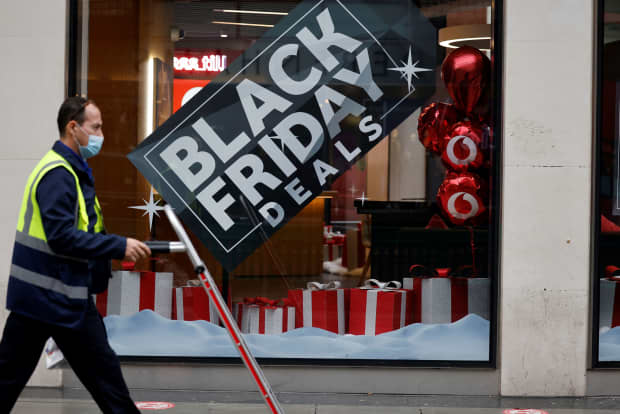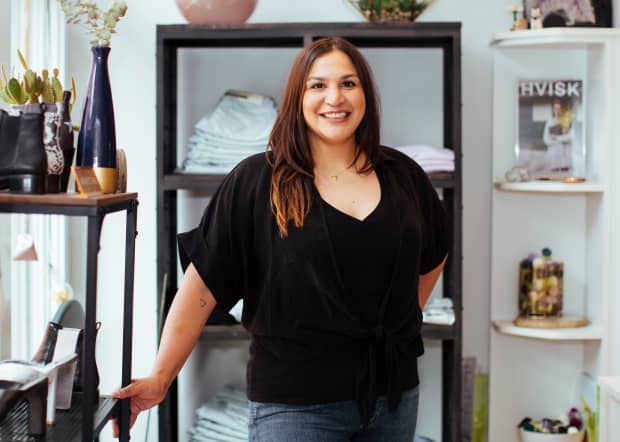
‘The competition from online retailers is always fierce for brick and mortar small business owners, but this year promises to be even more so as social distancing orders tighten with the return of the virus,’ said Anne Zimmerman, a co-chair at Small Business for America’s Future, an advocacy group. TOLGA AKMEN/AFP via Getty Images
When Joey Clark was able to reopen Kin, a boutique women’s clothing store located in Philadelphia, in June after being closed since early March, her customers couldn’t bear to look at dresses she so desperately wanted to sell to free up shelf space.
So she kept increasing the discounts she offered them to the point where she was practically pleading with customers to “just take the dress.” Sweatpants were flying off the shelves even at full price, so she was willing to take a hit on dresses.
During the lockdown period, she gave e-commerce a shot even though it goes against the “stepping into your best friend’s closet” experience she designed her collection around. That experience is impossible to recreate online, she said.

Last November, Joey Clark, pictured, took in over $110,000 in sales. This year she said she’ll be “lucky” if she gets $50,000. Rosie Simmons
“I can’t tell you not to even try that dress on because it’s going to look terrible. I also can’t add in those extra sales that you can get at the counter. It’s just someone sifting through a computer,” she said.
But given the exponential growth in daily new coronavirus cases reported in Philadelphia and across the nation, the city recently imposed a capacity constraint of five people per 1,000 square feet. With one other employee working with her at a time, that means only three customers can shop at once.
See also: How to shop safely this Black Friday with coronavirus cases on the rise
So she’s trying her luck again with e-commerce this holiday season; she said she’ll be “lucky” if she makes more than $50,000 in sales over the course of this month compared to last November when she made over $110,000 in sales. In the past, the holiday season has accounted for nearly 60% of her entire annual revenue.
Unlike companies such as Amazon
AMZN,
-0.03%,
Target
TGT,
+3.04%
and Macy’s
M,
+15.02%,
“I don’t have the luxury of offering 30% off everything” or comparable deals for an entire month, Clark said.
‘I don’t think people understand how difficult it is right now and if someone was looking at on paper and looking at the numbers I think people would put their money elsewhere’
If Clark were based in France she wouldn’t have to compete with Amazon and other big-box retailers because the French government instructed them to postpone online Black Friday discounts, while brick-and-mortar businesses are closed due to temporary lockdown measures.
“It would be incredible if Jeff Bezos could maybe just hold off for a day and give some to the little guys,” said Clark, who launched Kin three years ago after working for 13 years as a freelance stylist for companies such as Net-a-Porter. “I don’t think people understand how difficult it is right now.”
(Amazon did not respond to MarketWatch’s request for a comment.)
Small businesses need all the support they can get
“This is going to be a very hard winter for small businesses on a lot of fronts,” said Anne Zimmerman, a co-chair at Small Business for America’s Future, an advocacy group. “The competition from online retailers is always fierce for brick-and-mortar small-business owners, but this year promises to be even more so as social distancing orders tighten with the return of the virus.”
Additionally, “many small business owners have already depleted the federal relief that they were able to obtain earlier in the year and have no additional federal relief in sight,” said Xiomara Peña, vice president of engagement at Small Business Majority, a nonprofit advocacy group for over 70,000 minority-owned small businesses.
That’s caused thousands of small businesses to permanently close, the majority of which are owned by people of color, she said, even “while many of them have expanded their digital presence and their digital footprint.”
‘Many small business owners have already depleted the federal relief that they were able to obtain earlier in the year and have no additional federal relief in sight’
— Xiomara Peña, vice president of engagement at Small Business Majority
Of the small businesses that remain open, some 20% aren’t confident their business will ever recover from the pandemic, according to a July survey published by the National Small Business Association, an advocacy group representing over 65,000 small business members.
Nearly the same share of businesses are considering filing for bankruptcy, according to a separate survey published in October by SBAF.
“COVID-19 has wreaked havoc on our small-business community,” said Molly Day, vice president of public affairs at NSBA. “More this year than perhaps ever before, small businesses need their customers to show up not just for Small Business Saturday, but also for Black Friday, Cyber Monday and all the days throughout the holidays.”
“If we don’t make every effort to support small businesses now, not only will we have fewer restaurants and shops to patron in the future, but fewer local residents will be employed by those businesses,” Day added.
‘If we don’t make every effort to support small businesses now, not only will we have fewer restaurants and shops to patron in the future, but fewer local residents will be employed by those businesses’
— Molly Day, vice president of public affairs at the National Small Business Association
“If anything, corporations could help by investing dollars back into efforts to support small businesses during these challenging times,” Peña told MarketWatch. Another big help for small businesses would be to “provide the space for business owners to showcase their products” on sites like Amazon free of charge.
Small businesses should not try to compete with big corporations by offering discounts that will “barely even allow them to break even,” Peña said. Rather, they should direct their efforts towards communicating with customers exactly what “a dollar spent means to them.”
“It’s that kind of transparency and communication that allows them to build a space in customers’ hearts,” something corporations can’t compete with, she added.







































